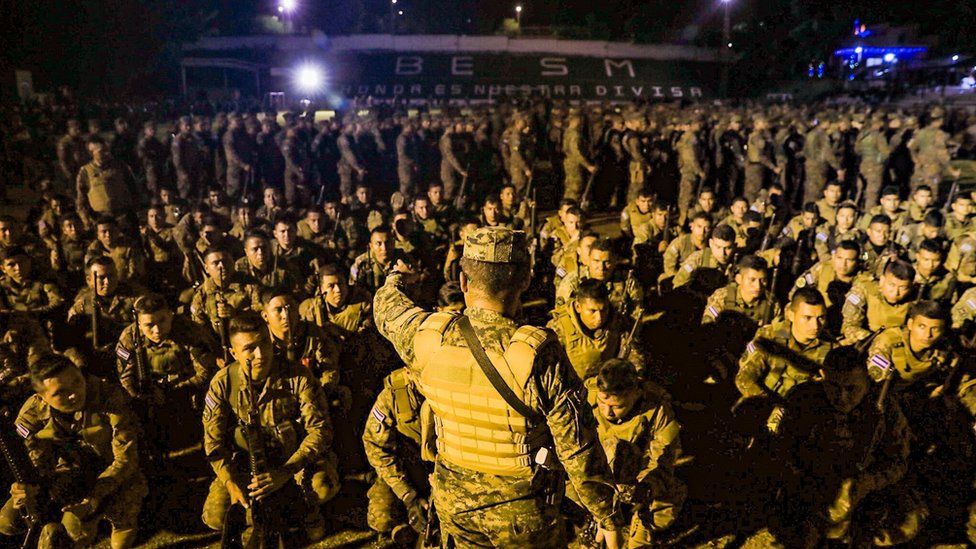Restoring Peace, at a heavy cost

“One of the most dangerous places on Earth.” That was one of the ways many travelers and journalists used to describe El Salvador pre 2022. Now, the gang signs in neighborhoods are painted over in white plaster. Bullet holes are pulled and rebuilt over. These actions are partly resulted in the policies of El Salvador’s current president, Nayib Bukele. But this drastic reduction in gang activity has not come without its shortcomings as well. Leading up to the crackdown, El Salvador had one of the highest mortality and murder rates in the entire world. The legislature of the country blames much of this statistic from the Mara Salvatrucha and Barrio 18-Sureños that hold great swathes of territory in both rural an urban areas in the country. But now, that statistic is dropping, and yet there is much controversy as to why
According to an article by the BBC, which discusses the Salvadoran military surrounding the city of Soyapango following the state of emergency President Bukele called for last march. Troop numbers were recorded to have reached up to 10,000, as the military then began a series of months long raids and strikes on various gangs in the sprawling metropolis. While foreign nations see the number of soldiers and authoritative presence as excessive, Bukele and the legislature have declared it the proper response, citing that homicides alone on March 26 reached the staggering number of 62, all committed by gangs and gangs alone. The most polarized group in many of these raids are the families and innocents caught in the crossfire. One resident of Soyapango, Guadalupe Perez, has seen the crackdown as a “welcome surprise.”
But while some people like Perez and more importantly Bukele see this crackdown as a welcome and effective change, there are side effects to many of the policies that have been enacted. In an article by the Guardian, we can find that nearly 2% of the entire adult population has been arrested in the country, with thousands of those people believed to actually be innocents and have no affiliation with any gang, and more than a 100 have died behind bars. In early February, Bukele celebrated the construction of a 40,000 capacity facility meant to house the “terrorists” that have remained in El Salvador. What makes the incredible success carry some doubt is just that. The effectiveness of the crackdown and the sudden disappearance of many gang leaders and top lieutenants, and the gang members who pull the trigger are the ones thrown behind bars. In a recent article by the Washington Post, Salvadoran journalist Juan Martínez d’Aubuisson mentions how one prominent gangster known as “El Crook” was escorted over the Salvadoran border to Guatemala. This and other examples of exempt higher level gang members has led to the suspicion of Bukele cutting deals with gang leaders in exchange for either reduced activity which will grant political immunity. The suspicion of which as led to the theory that crackdown began due to a secret falling out between the same gang leaders and the Bukele administration.
The articles differ in scope mainly. The BBC discusses the military occupation of Soyapango, with the troop count and brief mentions to the number of arrests, while the Guardian seeks to talk about the conditons of the arrested guilty and the innocent. Both are neutral in their argument, but rely on sources of interviewed local that share their opinions on either side. Like many global issues, there is complexity, even with a neutral standpoint.
At the end of the day, the one who truly is caught in the middle is the citizens of cities like Soyapango, where the threat of neighborhood gang taxes or a violent arrest by their government are issues that they have yet to clear. In relation to class themes, it’s important to note that Bukele won by populist ideals and policies and soon followed in the footsteps of many populists that came before him, and the only one left to pick up the pieces are his deceived supporters. Other important themes are the stereotypes in which we see Latin America, that being a violent gang ridden place. Everywhere in the world has violence. But this is one of those time when the stereotype is challenged, by pointing out why El Salvador was considered such a dangerous nation.
Sources
“El Salvador Crackdown Breaks the Gangs – at Huge Cost to Human Rights.” The Guardian. Guardian News and Media, February 20, 2023. https://www.theguardian.com/world/2023/feb/20/bukele-el-salvador-gangs-crackdown.
Murphy, Matt. “El Salvador: Thousands of Troops Surround City in Gang Crackdown.” BBC News. BBC, December 4, 2022. https://www.bbc.com/news/world-latin-america-63846159.
February 24, 2023 Cheney